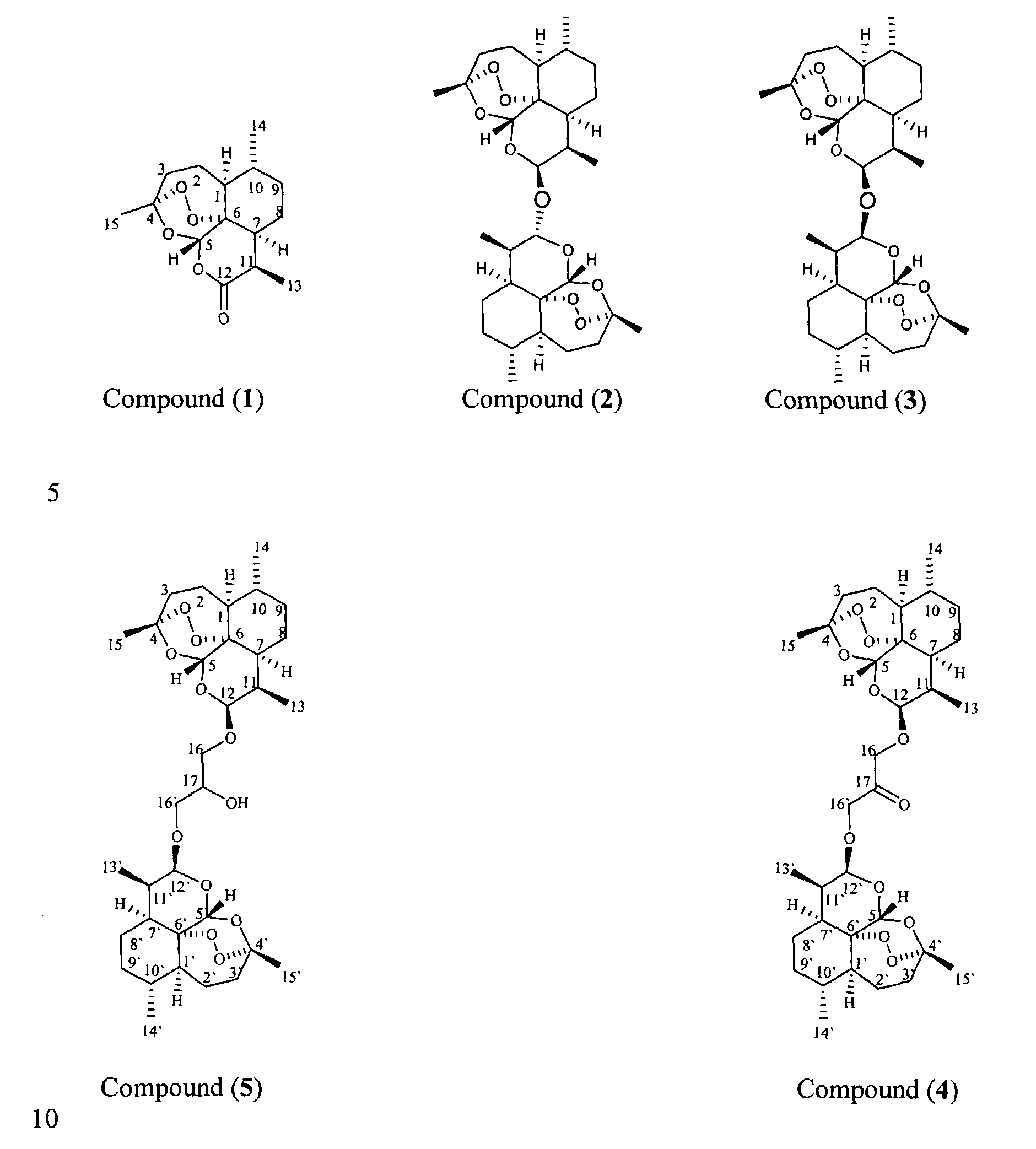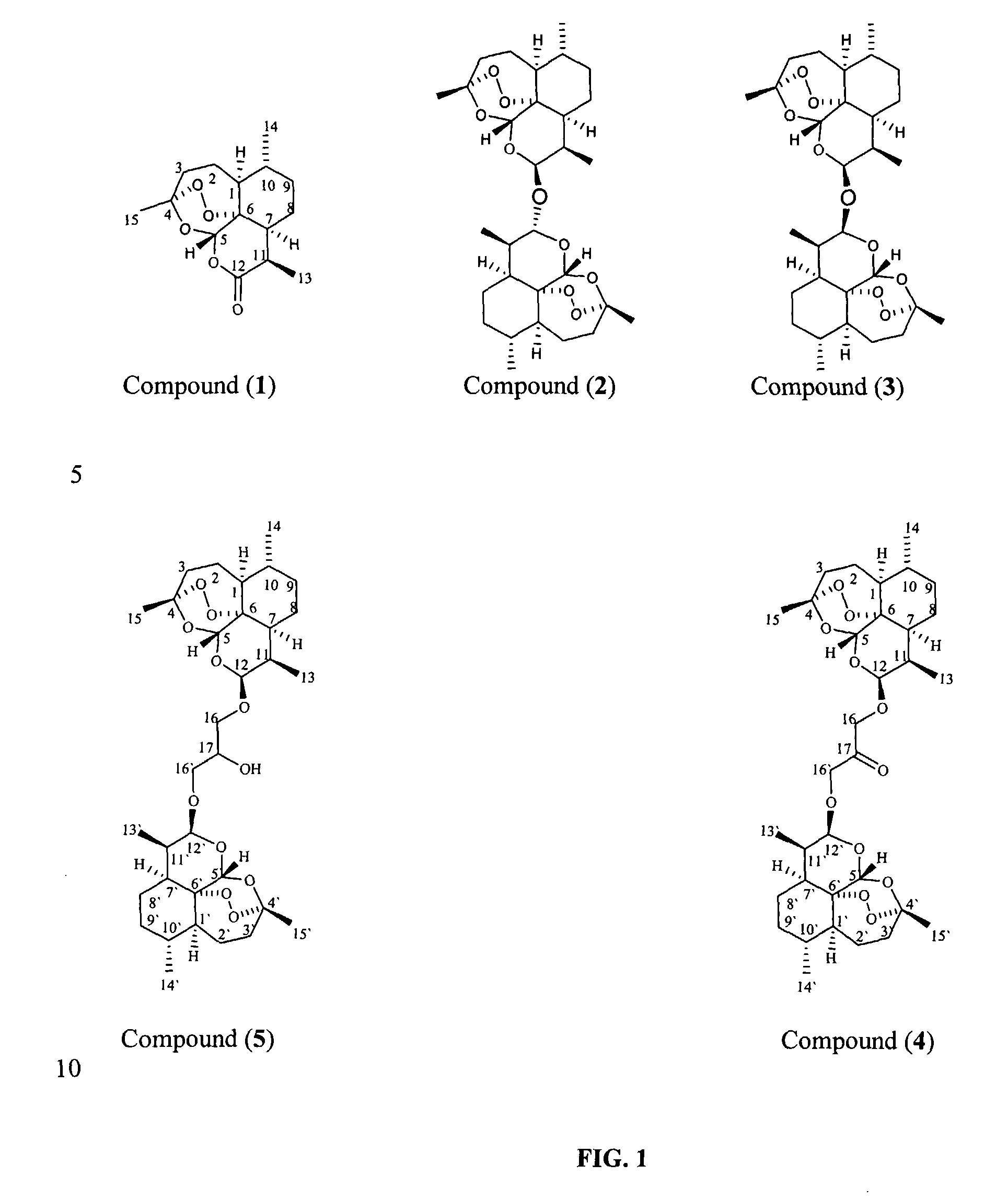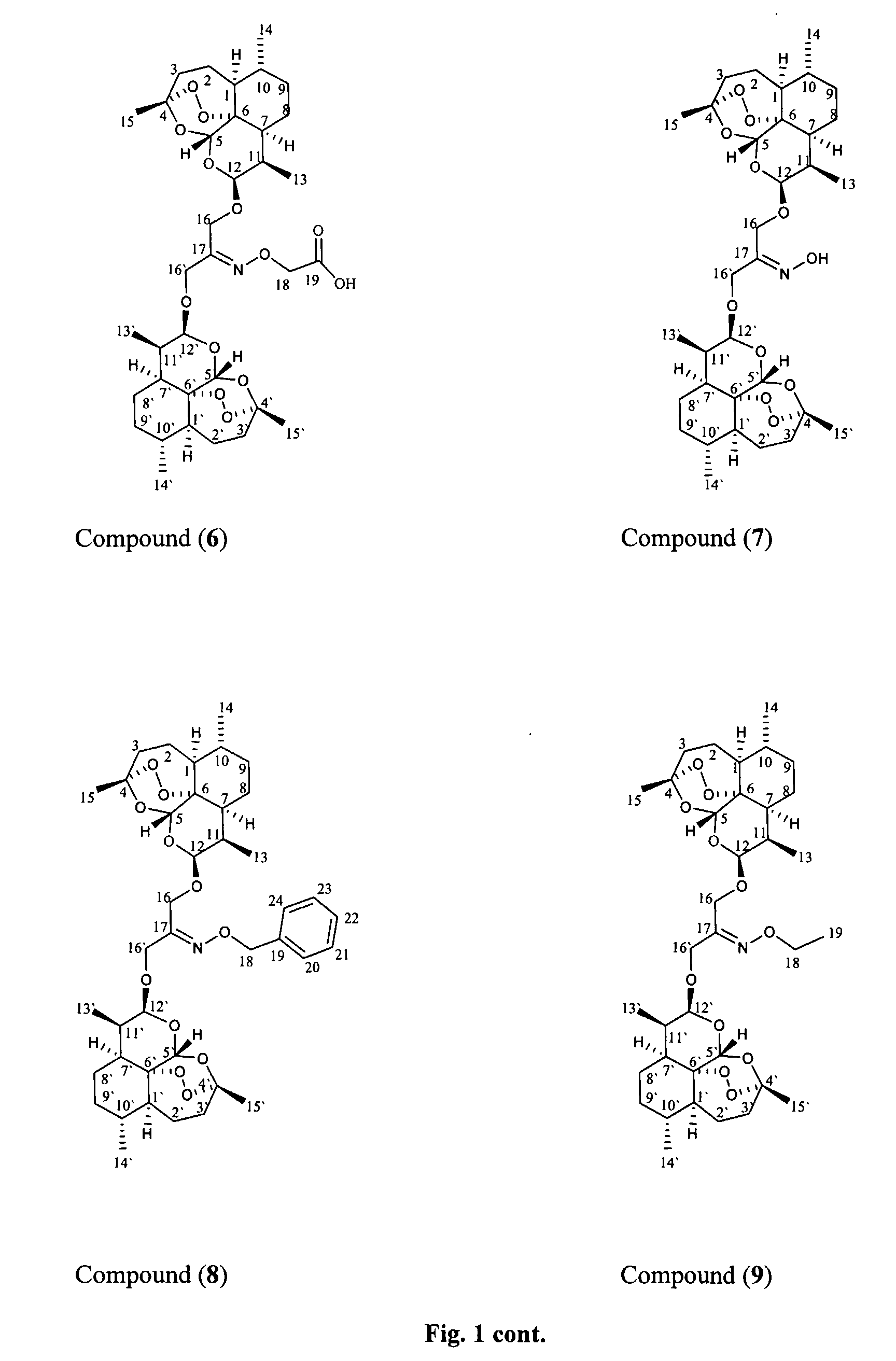Anticancer and Antiprotozoal Dihydroartemisinene and Dihydroartemisitene Dimers with Desirable Chemical Functionalities
a technology of dihydroartemisinene and dihydroartemisitene, which is applied in the field of dihydroartemisinin and dihydroartemisitene dimers, can solve problems such as formulation difficulties
- Summary
- Abstract
- Description
- Claims
- Application Information
AI Technical Summary
Problems solved by technology
Method used
Image
Examples
example 1
Preparation of the Oxime of the β,β-Dihydroartemisinin Dimer with Dihydroxyacetone (6)
[0032]β,β-Dihydroartemisinin dimer with dihydroxyacetone (4) (50 mg, 0.08 mmol), sodium acetate (40 mg, 0.48 mmol) and aminoxy-acetic acid (9.1 mg, 0.10 mmol, 1.2 eq) were mixed in 5 ml of dichloromethane (freshly distilled) and the mixture refluxed for 4 hours under argon. TLC indicated the completion of the reaction.
[0033]The resulting reaction product was evaporated to dryness, the residue dissolved in 6 ml of ethyl acetate, washed with water, dried over anhydrous sodium sulphate and the solvent evaporated to dryness.
[0034]The residue was chromatographed on silica gel column (300 mg) and eluted with chloroform with polarity increasing to 90:10 chloroform:methanol. Fractions were collected and combined according to TLC similarities to give one major fraction having the desired product (41.1 mg), with spectral data consistent with structure 6.
[0035]1H-NMR in CDCl3 at 400 MHz: δ 8.23 (1H, br s, OH)...
example 2
Preparation of the Oxime of the β,β-Dihydroartemisinin Dimer with Dihydroxyacetone (7)
[0038]β,β-Dihydroartemisinin dimer with dihydroxyacetone (4) (100 mg, 0.16 mmol), sodium acetate (80 mg, 0.48 mmol) and hydroxylamine hydrochloride (14 mg, 0.20 mmol, 1.3 eq) were mixed in 10 ml of dichloromethane (freshly distilled) and refluxed for 0.5 hours under argon. TLC indicated the completion of the reaction.
[0039]The resulting reaction product was evaporated to dryness, the residue dissolved in 6 ml of ethyl acetate, washed with water, dried over anhydrous sodium sulphate and the solvent evaporated to dryness.
[0040]The residue was chromatographed on silica gel column and eluted with hexane:ethyl acetate (90:10) with polarity increasing to 70:30. Fractions were collected and combined according to TLC similarities to give one major fraction having the desired product (76.0 mg), with spectral data consistent with structure 7.
[0041]1H-NMR in CDCl3 at 400 MHz: δ 5.42 (2H, s, H-5 and H-5′); 4.8...
example 3
Preparation of the Oxime of the β,β-Dihydroartemisinin Dimer with Dihydroxyacetone (8)
[0044]β,β-Dihydroartemisinin dimer with dihydroxyacetone (4) (100 mg, 0.16 mmol), sodium acetate (80 mg, 0.48 mmol) and O-benzyl hydroxylamine hydrochloride (28.1 mg, 0.18 mmol, 1.1 eq) were mixed in 5 ml of dichloromethane (freshly distilled) and refluxed for 18 hours under argon. TLC indicated the completion of the reaction.
[0045]The resulting reaction product was evaporated to dryness, the residue dissolved in 6 ml of ethyl acetate, washed with water, dried over anhydrous sodium sulphate and the solvent evaporated to dryness.
[0046]The residue was chromatographed on silica gel column and eluted with dichloromethane with polarity increasing to 90:10 dichloromethane:ethyl acetate. Fractions were collected and combined according to TLC similarities to give one major fraction having the desired product (64 mg), with spectral data consistent with structure 8.
[0047]1H-NMR in CDCl3 at 400 MHz: δ 7.35 (5...
PUM
| Property | Measurement | Unit |
|---|---|---|
| Fraction | aaaaa | aaaaa |
| Density | aaaaa | aaaaa |
| Density | aaaaa | aaaaa |
Abstract
Description
Claims
Application Information
 Login to View More
Login to View More - Generate Ideas
- Intellectual Property
- Life Sciences
- Materials
- Tech Scout
- Unparalleled Data Quality
- Higher Quality Content
- 60% Fewer Hallucinations
Browse by: Latest US Patents, China's latest patents, Technical Efficacy Thesaurus, Application Domain, Technology Topic, Popular Technical Reports.
© 2025 PatSnap. All rights reserved.Legal|Privacy policy|Modern Slavery Act Transparency Statement|Sitemap|About US| Contact US: help@patsnap.com



